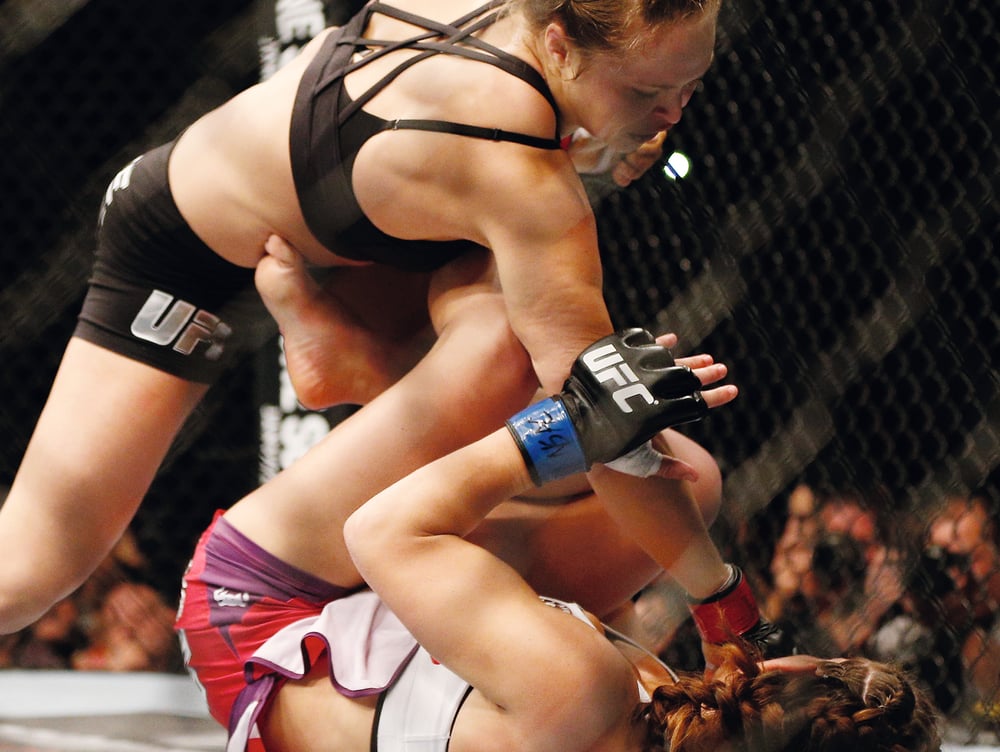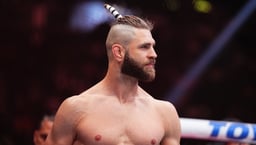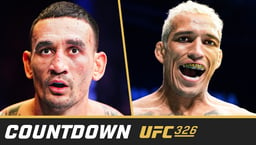
Issue 113
April 2014
It’s been an incredible year for UFC bantamweight champion Ronda Rousey at the forefront of the UFC’s newest and, arguably, most exciting division.
Mixed martial arts is still a relatively young sport that’s had few truly historic moments. And yet Ronda Rousey had her fair share in 2013. The former Strikeforce bantamweight champion and Olympic medal-winning judoka joined the UFC and kick-started its first female division by headlining UFC 157 alongside Liz Carmouche.
Not only did Rousey become the organization’s first female champion, but she was also one of the first women to step a competitive foot inside the Octagon. Not bad for a fighter with just six pro fights to her name prior to the opening bell. And since that night she’s gone on to become one of the biggest stars in mixed martial arts.
With two successful outings under her belt in 2013, the second of which came against Miesha Tate after a controversial season coaching on The Ultimate Fighter, Rousey has gone on to transcend the Octagon and become a poster-child of the next generation of MMA champions.
With blockbuster movie cameos and countless mainstream TV and magazine appearances, Rousey is the biggest star in women’s MMA and her second Fighters Only World MMA Awards trophy was perhaps one of the biggest shoe-ins at this year’s ceremony.
“It’s a huge deal and I’m very honored to be here, but I wasn’t ready to sit back and relish any of it until after the fight was already done and I’d won,” Rousey reflects when asked about her UFC debut.
Although confident she would defeat Carmouche, Ronda first had to come through some adversity, when the challenger locked in a standing neck crank. Yet perhaps the real struggle for Rousey, and the other women who’d eventually follow her into the UFC, was the acceptance of president Dana White. But, it was Rousey’s performances inside the Octagon that convinced him it was time to give the ladies a chance.
“When I met her, that was the moment I knew I wanted women in the UFC. That and the Miesha Tate fight (Strikeforce: Tate vs Rousey, March 2012),” White explains. “I said it back then and I’ll say it again, if 99.9% of the men in this country got put in the same armbar Miesha Tate was put in, not only would they tap, they’d be screaming and crying like babies.”

After defeating Carmouche, Rousey continued her stellar year when she and arch-nemesis Tate became TUF’s first-ever female coaches on the 18th season. The verbal warfare was continuous through to their rematch at UFC 168 in December. According to Rousey, the TUF experience was something she wouldn’t do ever again.
“TUF 18 was really good for the women’s division and I think it needed to happen, but you couldn’t pay me $10 million to do it again,” she laughs. “(Miesha and I) have been involved with each other long enough that we kind of have a rhythm of how we deal with each other. She mostly doesn’t look me in the eye or talk to me a lot of the time, which I like to relate to Mike Tyson’s speech about seeing a chink in the armor if your opponent won’t look you in the eye.”
According to Rousey, her main gripe was with the way she was portrayed on the show. “I have to accept not everybody is going to like me. I live a life of exposure and people aren’t going to see how I am all the time. All they’re seeing is the face I put on. I’m not going to be on a first date with everybody all the time. I accept the fact I’m going to make mistakes and whatever people think is what they think.”
She may have struggled to hold back her feelings on the show, but when it came for the two to settle their differences in the rematch, Rousey dominated.
Even though it took three rounds for her to finally defeat Tate, she used all 11 minutes to show just how much she’d improved in all areas of her game, using her jab and improved ground skills to control Tate and take the fight wherever she wanted it to go.
While the fight itself was a great showcase for her skills, Rousey didn’t endear herself to fans when she refused to shake Miesha’s hand after the fight. Even though there was a chorus of boos echoing throughout the MGM Grand Arena, Rousey stood firm and stayed true to her beliefs.
“I wasn’t surprised at all (by the boos), I was aware of the role I was in,” she said afterwards. “One of my favorite analogies is that Batman played the bad guy and let Two-Face look like the good guy because that’s what Gotham City needed at the time. For every fight I have I approach it in terms of what’s needed at the time.
“As for not shaking Miesha’s hand, the day she apologizes to my coach, Edmond Tarverdyan, and (TUF pick) Chris Beal, and they accept that apology, I’ll consider shaking her hand again. Like I said, boos aren’t more important than family, and if I feel you’ve done wrong against my family, you need to make it right.”
With two successful title defences, roles in The Expendables 3 and Fast & Furious 7, plus a host of other opportunities opening up for her, whether you hate or love Ronda Rousey, the UFC’s first lady certainly made a huge impact in 2013.
...









